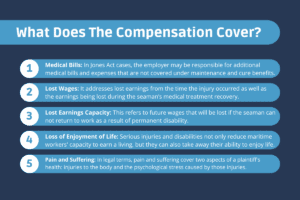Although working on a ship or any type of vessel can be a lucrative profession, it is inherently dangerous. This is one of the reasons why the Jones Act was put in place in 1920 when Congress passed the Merchant Marine bill. The Jones Act encompasses many aspects regarding shipping, trade, and port rules. It also includes provisions for compensation to seamen who are injured at work due to negligence by a vessel’s owners, captain, or members of the crew. If injuries occur due to the carelessness and negligence of another party, employers may be responsible for compensatory damages.

Jones Act Seamen’s Compensation Categories
The Jones Act compensation rules were based on existing laws that cover railway employees. They share some similarities to standard workers’ compensation, but the complex nature of maritime law separates Jones Act compensation rules from all others.
The Jones Act section on seamen’s compensation is closely based on the Federal Employment Liability Act (FELA). FELA makes railroads engaged in interstate trade liable for any injuries to railway workers if it’s because of the owner’s negligence. Neither FELA nor the Jones Act are considered identical to regular workers’ compensation because they take into account industry-specific factors that don’t apply to other jobs.
If seamen are injured on the job, even if the vessels are moored in port, they are eligible for the following types of compensation per the Jones Act:
Medical Bills: In Jones Act cases, the employer may be responsible for additional medical bills and expenses that are not covered under maintenance and cure benefits. This may include medical expenses for immediate treatment and its related costs as well as future medical costs considered to be necessary and reasonably acceptable. Examples of these costs include travel expenses to out-of-town medical facilities, physical and occupational therapy, psychological counseling, specialized medical equipment, and nursing care.
Lost Wages: On-the-job injuries can prevent a seaman from returning to work either temporarily or, in cases of total disability, permanently. This requires two different types of compensation under the Jones Act: lost wages and lost earning capacity. Lost wages compensation is the first type. It addresses lost earnings from the time the injury occurred as well as the earnings being lost during the seaman’s medical treatment recovery.
Lost Earnings Capacity: Lost earnings capacity is the second type of wage-related compensation. This refers to future wages that will be lost if the seaman can not return to work as a result of permanent disability. There are many factors involved when determining lost earnings capacity, including age, gender, race, and the estimated working life expectancy. Other factors may include the estimated value of health insurance benefits, vacation time, and/or retirement plans. In some cases, anticipated promotions can be taken into consideration, provided that the seaman can show enough proof.
Loss of Enjoyment of Life: Serious injuries and disabilities not only reduce maritime workers’ capacity to earn a living, but they can also take away their ability to enjoy life. Loss of mobility, constant pain and lack of physical stamina prevent injured seamen from enjoying many leisure activities or spending time with friends, family, or loved ones.
Pain and Suffering: As in non-maritime personal injury law, the Jones Act allows for pain and suffering compensation. In legal terms, pain and suffering cover two aspects of a plaintiff’s health: injuries to the body and the psychological stress caused by those injuries. An injured seaman may be awarded pain and suffering compensation for aches, inability to perform physical activity, disfiguring scars, depression, and shortened life expectancy. Pain and suffering compensation is often granted in addition to general damage awards.
Additional Resources
If you are a seaman and you have been injured while on the job, you may qualify for the previously mentioned damages. It’s important to understand your legal options and rights before signing any insurance paperwork. In fact, signing over rights prematurely is a common mistake that many seamen make.
Learn your rights and options following a Maritime Injury. Fill out our contact form to learn more information about your rights and what you can do.